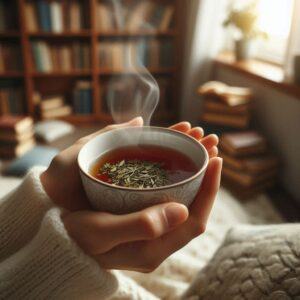
I know too well how anxiety can feel like an uninvited guest that overstays its welcome. You’re not alone; many of us grapple with this challenge every day. In a quest for relief, it’s tempting to turn to quick fixes, but what if I showed you a different path? Natural ways to alleviate anxiety aren’t merely old wives’ tales; they’re supported by a growing body of research and real-world experience.
Why consider the natural route? Well, synthetic solutions, while helpful for some, aren’t everyone’s cup of tea. They often come with side effects, and not everyone wants to walk down that road. It’s why I’m jazzed to share this journey with you, emphasizing the value of nature-derived ways to keep anxiety at bay.
Now, don’t get me wrong. I’m not suggesting you ditch your doctor’s advice—far from it. Think of these methods as complementary tools in your toolkit. From diet to sleep and exercise, each contributes to a harmonious life rhythm that dances to the beat of well-being. And yes, there’s robust evidence endorsing these alternatives, underscoring their legitimacy and effectiveness.
Adopting a natural approach is like nurturing a garden; it’s a commitment and a labor of love. It takes time and patience, but the blooms of tranquility are worth it. So, let’s ease into this exploration with open minds and a sprinkle of expectation. Who knows? You might discover the elixir for your peace of mind nestled in these simple, everyday habits.
In the upcoming segment, I’ll guide you through the calming power of physical activity. They say ‘motion influences emotion,’ and I’ll explain how the simple act of moving can harmonize your inner world. You’ll see why lacing up your sneakers could be one of the most therapeutic decisions you make today.
The Calming Power of Physical Activity
You may not immediately link exercise with anxiety relief. It’s more often associated with physical health, but it shouldn’t be overlooked as a powerful tool for mental well-being. Engaging in physical activity triggers the release of endorphins in the brain – these are chemicals that naturally improve mood and act as painkillers.
Low-impact exercises can be especially beneficial for individuals dealing with anxiety. If the thought of high-intensity workouts seems daunting, consider yoga, pilates, or a simple daily walk. These activities are not only approachable but can also significantly lower anxiety levels and increase feelings of calm.
Consistency is key when integrating exercise into your life for anxiety relief. You don’t need to spend hours at the gym; even brief bouts of activity can make a difference. A quick 10-minute walk or a brief yoga session can contribute to better mental health. Over time, building up a habit of regular exercise can result in long-lasting improvements to your anxiety levels.
Natural Ways Reduce Anxiety

Certain herbal supplements have been found to help alleviate anxiety. Popular options include:
- Chamomile: Known for its calming effects and ability to improve sleep.
- Lavender: Often used in aromatherapy, lavender can reduce anxiety and improve mood.
- Valerian Root: Commonly used for insomnia, it also has anxiety-reducing properties. WebMD discusses various natural remedies, including these herbal supplements, that can be effective in managing anxiety (https://www.webmd.com/anxiety-panic/natural-remedies-for-anxiety).
Mindfulness and Meditation: Pathways to Inner Peace
You may not think much about the present moment. It’s easy to get caught up in past regrets or future what-ifs. But I’ve found that paying attention to the ‘here and now’ can be a powerful antidote to anxiety. Mindfulness means tuning into your current experiences and recognizing them without judgment, whether good, bad, or neutral.
Meditation, a cousin of mindfulness, involves more structured practices like deep breathing or progressive muscle relaxation. When you meditate, you’re training your mind to focus and redirect your thoughts, which can reduce the chaos that often fuels anxiety.
The variety of meditation techniques means there’s likely one that fits your style and needs. For instance, deep breathing exercises encourage you to focus on the rhythm of your breath, which can help quiet external and internal noise. Progressive muscle relaxation involves tightening and then releasing different muscle groups, promoting physical and mental relaxation.
By making mindfulness and meditation a part of your daily life, you create a sanctuary of calm within yourself. Start small, with maybe five minutes of meditation per day, and steadily increase the time as you become more comfortable. Consistent practice is key to reaping the benefits over the long term. And believe me, the sense of peace it brings can be quite profound.
Nutrition’s Role in Easing Anxiety
You might not immediately link what’s on your plate to the feelings in your mind, but I assure you, the connection is strong. The foods we eat can directly influence our mood and anxiety levels. Think of your diet as a support system for your mental well-being.
Nutrient-rich foods that are high in omega-3 fatty acids, antioxidants, and essential vitamins do more than keep your body healthy; they also act as fuel for your brain.
Omega-3s, found in fish, flaxseed, and walnuts, are particularly important for cognitive function and mood regulation. Antioxidants, which you can get from berries and leafy greens, help combat oxidative stress that may be linked to anxiety.
A sustainable approach to nutrition involves more than what to include; it also means knowing what to limit.
Caffeine and alcohol might promise temporary relief, yet excessive consumption can heighten anxiety over time. Processed foods, with their high sugar content and additives, can also disrupt your mood stability. Reducing these anxiety-aggravating substances can lend to a more even-keeled emotional state.

Simple changes like incorporating a rainbow of fruits and vegetables, choosing whole grains, and hydrating well can lay the foundation for a steady mood. It’s not about overhauling your diet overnight but making mindful choices one meal at a time.
As we shift our focus toward fostering quality sleep, remember that your diet plays a role in this too. Certain foods can either contribute to restlessness or promote better rest. With the scene set for a deeper dive into sleep hygiene, keep in mind that what you eat can make closing your eyes each night a more tranquil experience.
Silence Your Anxious Mind: Experience the #1-Rated Meditation Audio & Finally Find Peace.
The Comfort of Social Connections
Nurturing my circle of trust and support has become a cornerstone of my journey towards tranquility. Whether I’m sharing thoughts with family, bonding with friends, or interacting in a support group, each conversation can therapeutically untangle the threads of anxiety that weave through my days.
Research echoes this — relationships infused with understanding and empathy can fortify me against life’s stressors. The companionship of someone who listens without judgment, who offers a laugh when the clouds of worry gather, is a natural anxiolytic. It’s refreshingly human to seek solace in the company of others, and I remind myself that it’s okay to lean on supportive shoulders when the going gets tough.

Embracing both the giving and receiving aspects of social interactions, I can help cultivate an environment where calmness grows. Advice and shared experiences from others who’ve walked similar paths can provide me with practical strategies and the assurance that I’m not alone.
For those days where face-to-face camaraderie isn’t feasible, technology steps in to bridge the distance. Video calls, messaging apps, and even virtual support communities offer continuous threads of connection. The key is to actively seek out these interactions rather than retreating into isolation when anxiety strikes.
I’m mindful that building and maintaining social bonds is a deliberate process that calls for openness and, occasionally, vulnerability. Yet, it’s this very vulnerability that allows trust to be established and mutual support to flourish.
Committing to nurturing solid relationships is not only about improving my present — it’s a long-term investment in my mental health. While these natural methods are often remarkably effective, I acknowledge they might be part of a broader approach, depending on individual needs. If my anxiety ever feels unmanageable, I know reaching out to a healthcare professional is a prudent next step.
In closing, crafting a multi-faceted natural defense against anxiety — that includes regular exercise and mindfulness, careful attention to diet and sleep, as well as the warm embrace of social support — sets the stage not just for managing anxiety, but for welcoming an enduring sense of well-being.
Ways Reduce Anxiety Attacks
Reducing anxiety attacks requires a multifaceted approach that combines lifestyle adjustments, mindfulness techniques, and sometimes professional intervention. One effective strategy is to incorporate regular exercise into your routine. Physical activity not only helps to alleviate stress but also boosts endorphin levels, promoting a sense of well-being and relaxation.
Aim for at least 30 minutes of moderate exercise most days of the week, such as brisk walking, jogging, or yoga. Additionally, prioritize sufficient sleep as lack of rest can exacerbate anxiety symptoms. Establish a consistent sleep schedule, create a relaxing bedtime routine, and ensure your sleep environment is conducive to rest.

Another crucial aspect of managing anxiety attacks is practicing mindfulness and relaxation techniques. Deep breathing exercises, such as diaphragmatic breathing or the 4-7-8 technique, can quickly calm your nervous system during moments of heightened anxiety.
Incorporating meditation or guided imagery sessions into your daily schedule can also help you develop a greater awareness of your thoughts and emotions, enabling you to respond to stressors more effectively. Furthermore, consider limiting caffeine and alcohol intake, as these substances can trigger or worsen anxiety symptoms in some individuals. By implementing these strategies consistently and seeking support from a mental health professional if needed, you can significantly reduce the frequency and intensity of anxiety attacks, promoting a healthier and more balanced lifestyle.
References:
- Healthline, “Natural Ways to Reduce Anxiety,” https://www.healthline.com/health/natural-ways-to-reduce-anxiety
- Medical News Today, “Natural Remedies for Anxiety: 15 Ways to Find Calm,” https://www.medicalnewstoday.com/articles/322396
- WebMD, “Natural Remedies for Anxiety and Stress,” https://www.webmd.com/anxiety-panic/natural-remedies-for-anxiety

